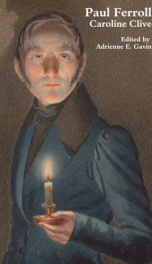paul ferroll a tale

“The novel is in its third edition. ‘Strikingly original’—‘a phenomenon in literature’—‘never to be forgotten’—‘grand and fearful force of contrast’—‘marvellous’—‘powerful effect’—‘faultless work of art’—‘admirable and almost awful power’—such are the praises of an applauding press. We beg to add the humble tribute of our homage.” So wrote a reviewer for the Saturday Review in 1856 of Caroline Clive’s Paul Ferroll (1855). But if readers and reviewers were almost unanimous in their praise of Clive’s novel as a nearly flawless work of art, many were troubled by what they saw as its questionable morality. “Nothing looks more peaceful and secure than a country house seen at early morning,” the novel begins. But behind that tranquil exterior is hidden a horrible crime: Paul Ferroll’s wife lies violently murdered in her bed. A servant is arrested and later acquitted for the crime, time moves on, and Ferroll eventually remarries. A respected magistrate, a gifted author, and a loving husband, Ferroll’s character nonetheless seems to have a dark side. Why does he shun the friendship of his neighbours, neglect his young daughter, and evince indifference when the villagers die during a cholera outbreak? Is his strange behaviour caused by remembrance of his first wife’s untimely death, or does there lie hidden a much darker secret? Hugely popular and influential in its time and recognised as the successor to Jane Eyre and the predecessor of the sensation novels of Mary Elizabeth Braddon, Paul Ferroll has suffered from an unfortunate neglect in the past century. This new edition features an introduction and notes by Adrienne E. Gavin as well as a chronology of Clive’s life and career and excerpts from contemporary reviews.
Info about the book
Author:
Series:
Unknown
ISBN:
1142521311
Rating:
3.5/5 (3)Your rating:
0/5
Languge:
English
Users who have this book
Users who want this book
What readers are saying
What do you think? Write your own comment on this book!
write a commentif you like paul ferroll a tale try:
Other books by this author
Do you want to read a book that interests you? It’s EASY!
Create an account and send a request for reading to other users on the Webpage of the book!



